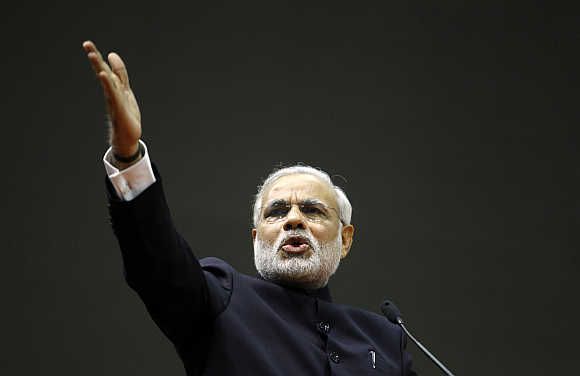
With labour reforms facing stiff resistance from trade unions, Prime Minister Narendra Modi on Monday said changes in the laws will be carried out through consensus and in consultation with them.
Inaugurating the 46th Indian Labour Conference in New Delhi, he said, ‘changes in the labour laws will be made with the concurrence of the unions and the consultation process will continue’.
The government has set up a high-level inter-ministerial committee under Finance Minister Arun Jaitley to hold discussions with the unions on issues concerning labour.
The committee held its first meeting on Sunday during which host of labour related issues were discussed.
Talking about different interest groups, Modi said that there was a thin line dividing the interest of industry and industrialists, government and nation, and labour and labour organisations.
Often one talks about saving the industry but end up protecting industrialists, he said, adding there was a need to recognise this thin line and adopt a balanced approach to the deal with the issues and change the environment.
The Prime Minister also regretted that the number of apprentices in the country was very low and asked the industry to provide more opportunities to them with a view to increase their numbers from 300,000 to at least 20 lakh (Rs 2 million).
The number of apprentices in China is 2 crore (20 million), Japan 1 crore (10 million) and Germany 30 lakh (3 million) as against only 300,000 in India, he said.
"If we want to move ahead, we need to give opportunities to our youth. Giving opportunities to apprentices is the need of the hour," Modi said, adding there was a need to focus on people who are unemployed.
Raising the labour issues, BJP-backed Bharatiya Mazdoor Sangh president and Vice-Chairman of 46th ILC, B N Rai said that rapid economic growth should not be at the cost of the workers.
The Prime Minister underlined the need for encouraging and recognising innovations at every level by the industry as well as the government.
"Nobody recognises the capacity of labourers to innovate. I have to change this atmosphere," he said.
Modi said the government, industry and trade unions would have to think about ways to improve respect for workers.
The government would give certificates to workers having traditional skills as part of the initiatives to recognise their importance, he added.
Observing that country cannot remain happy if labourers are unhappy, Modi said, they contribute immensely for nation building and businesses cannot run properly in absence of cordial relation between workers and employers.
The Prime Minister also expressed concern over the lack of respect for the workers in Indian society.
"There is a wrong habit which has crept in, we do not respect our labour enough, he said," adding the law was needed for those who do not treat labour as fellow human beings.
He also made a case for simplification of the labour laws which currently are complex and can be interpreted by all stake holders for their own benefit.
"It is my effort to simplify the laws so that even the poorest are able to understand their rights and avail them," Modi said.
Modi said that he has seen poverty and does not need to take camera persons to see poverty.
"I have seen and experienced poverty, I do not need to go somewhere with a cameraman to know about poverty," Modi said.
The Prime Minister asked industry to promote apprenticeship and make it as part of their corporate social responsibility.
"You (industry) cannot keep the door closed for apprentices for long time," he added.
The government, he said, has taken several steps for the welfare of labour.
These include raising minimum pension to Rs 1,000 per month, introduction of social security and pension schemes and online PF accounts.
"We are empowering labour though technology." he added.
Highlighting the social security schemes launched by the government, he said these schemes would also benefit workers in the unorganised sectors.
Observing that the schemes are not for rich, he said they would change the lives of poor. He even asked trade unions to promote these schemes.
Modi also raised the health issue of labour.
"All their medical records will now be available online," he said.
Image: Prime Minister Narendra Modi; Photograph: Reuters











 © 2025
© 2025